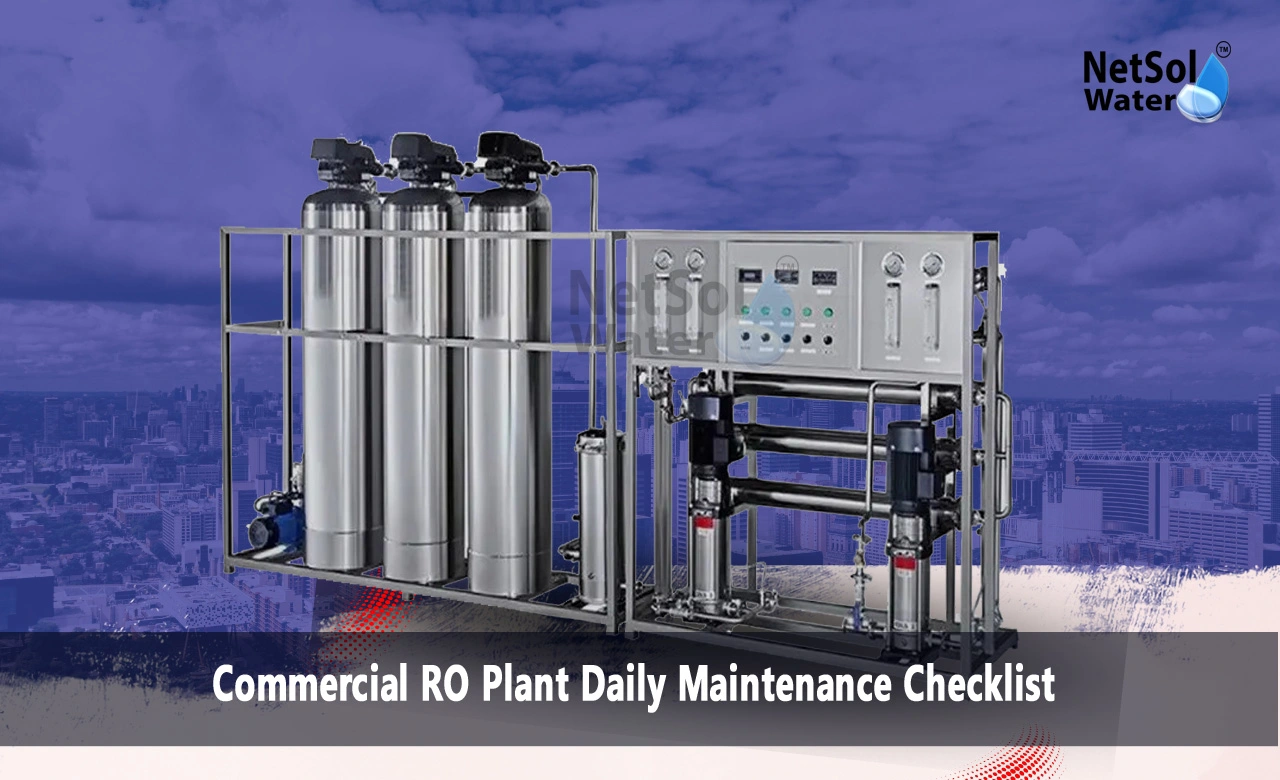What is the Daily Maintenance Checklist for a Commercial RO Plant?
Industries depend on clean water as their lifeline. Commercial RO plants produce high-quality purified water for purposes ranging from food preparation to electronics manufacture. Keeping an RO plant working effectively involves continuous maintenance. We'll discuss the regular maintenance procedures that maintain a commercial RO plant functioning at peak performance.
Why Daily Maintenance Matters?
Reverse osmosis demands complex, precision equipment. Small difficulties can rapidly become large problems if you neglect them. Daily maintenance uncovers possible flaws early, preventing costly breakdowns. It also guarantees your RO plant continually delivers high-quality water that satisfies requirements.
Skipping maintenance diminishes efficiency, degrades water quality, and shortens equipment life. The tiny time investment in daily checks pays out substantially in the long term. Let's look into the primary areas you need to focus on for daily RO plant maintenance.
Pre-Treatment System Checks
The pre-treatment system preserves your RO membranes. It eliminates bigger particles and impurities that could harm or dirty the fragile RO membranes. Check these pre-treatment components daily:
Multimedia Filters
• Check inlet and outlet pressure. High pressure difference suggests blockage.
• Make sure the backwash cycle ended overnight.
• Look at media condition through the sight glass if you have one.
Activated Carbon Filters
• Watch pressure drop across filter vessels.
• Look for any carbon fines seeping into the wastewater.
• Make sure chlorine levels in water exiting carbon filters are zero.
Water Softeners
• Check brine tank salt levels and add more as needed.
• Confirm the regeneration cycle ran appropriately.
• Test effluent water hardness to ensure sufficient softening.
Antiscalant Dosing System
• Check chemical tank levels and refill when low.
• Make sure the pump works and doses at the proper rate.
• Look at the injection quill for any obstruction or damage.
Cartridge Filters
• Watch differential pressure across filter housings.
• Change cartridges if differential pressure is too high.
• Examine spent cartridges for unusual fouling or damage.
RO Feed Water Quality Checks
Feed water quality directly affects membrane performance and longevity. Monitor important feed water parameters daily to catch pre-treatment system concerns. Essential feed water tests include:
• Measure feed water conductivity/TDS.
• Test pH and adjust if it's outside the good range.
• Check oxidation-reduction potential (ORP).
• Make sure chlorine levels are zero.
• Monitor feed water temperature.
• Measure turbidity and SDI if you have the equipment.
Investigate any major changes in these data from typical values right away. Bad feed water quality can quickly destroy membranes.
RO Plant Performance Monitoring
The RO plantconstitutes the core of any commercial RO facility. Monitor important performance indicators regularly to maintain efficient operation and quality permeate output. Essential RO plant checkups include:
• Record feed, concentrate, and permeate flow rates.
• Watch feed, concentration and permeate pressures.
• Calculate and track normalized permeate flow.
• Measure permeate conductivity/TDS.
• Check permeate pH.
• Calculate salt rejection percentage.
• Monitor differential pressure across RO vessels.
• Record recovery rate.
Track these figures over time to notice modest variations that might signify impending difficulties. Investigate and correct abrupt changes immediately.
RO Membrane Cleaning Considerations
Membrane cleaning isn't a daily activity, but it's necessary for RO upkeep. Watch these crucial indicators to know when you need to clean:
• Normalized permeate flow lowers 10-15%.
• Differential pressure increases 15-20%.
• Salt rejection drops 5-10%.
Schedule a cleaning when you achieve these levels. Choose alkaline or acid cleaning according on the unique fouling situation. Always follow the membrane maker's cleaning directions.
Post-Treatment System Checks
Many RO plants use post-treatment to adjust final water quality. These systems need daily attention too:
Degasifiers
• Check blower operation and air flow.
• Monitor pH of degasified water.
• Look at packing material condition if feasible.
Remineralization Systems
• Check calcite or dolomite media levels.
• Monitor hardness and alkalinity of remineralized water.
• Make sure the CO2 injection system works properly if you utilize one.
UV Disinfection
• Confirm all UV bulbs function.
• Check UV intensity values.
• Verify flow rate through UV reactors.
Chemical Dosing Systems
• Check chemical tank levels and refill when low.
• Make sure all dosage pumps operate.
• Confirm adequate chemical injection rates.
Final Water Quality Checks
RO plants seek to generate water that fulfils needed standards. Test final water quality daily:
• Measure conductivity/TDS.
• Check pH.
• Test for remaining chlorine (if you use chlorination).
• Monitor other characteristics unique to your needs (such silica or boron).
Investigate and correct any deviations from standards rapidly.
Documentation and Record Keeping
Good records are crucial for RO plant maintenance. Daily logs give data for addressing problems and enhancing system performance. Record these things daily:
• All measured parameters and readings.
• Any maintenance activities you conducted.
• Chemical additions or substitutions.
• Unusual observations or events.
• Operator notes and remarks.
Consistent record keeping lets you examine trends and predict when you'll need major maintenance.
Safety Considerations
Always prioritize safety in RO plant operations. Do these safety checks daily:
• Make sure all safety equipment works and is in place.
• Look for any chemical leaks or spills.
• Ensure you have and utilize proper PPE.
• Confirm emergency eyewash and shower stations operate.
• Check for trip hazards or other safety issues.
Conclusion
Maintaining a commercial RO plant takes regular attention to detail. Follow this checklist to keep your RO plant generating high-quality water efficiently and dependably. These everyday duties might seem like a lot, but they pay off with fewer downtime, cheaper operating expenses, and longer equipment life. Consistent maintenance gets the most out of your RO investment.
To explore customised commercial RO plants, Industrial RO plants, ETP or STP solutions for your needs in your areas and nearby regions, contact Netsol Water at:
Phone: +91-965-060-8473, Email: enquiry@netsolwater.com



